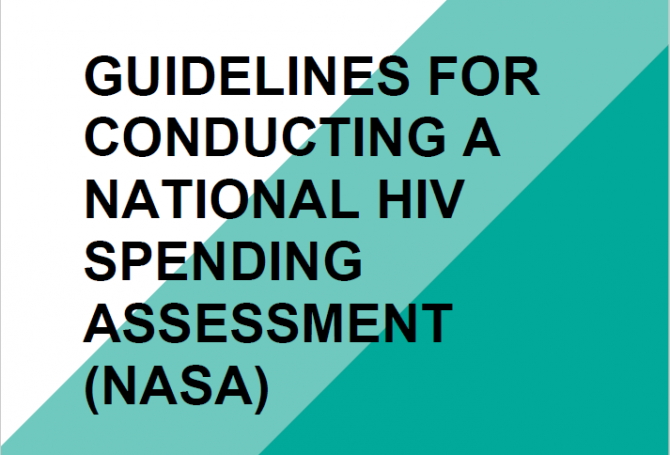

Feature Story
UNAIDS releases updated guidelines for conducting National AIDS Spending Assessments
14 November 2025
14 November 2025 14 November 2025UNAIDS is releasing an updated version of its guidelines for conducting National AIDS Spending Assessments (NASA). The guidelines are aimed at NASA implementers and HIV programme managers utilizing HIV expenditure data to influence budgetary, policy and programmatic decisions.
NASA is a comprehensive, systematic approach to tracking HIV expenditures and analyzing financial resources dedicated to the HIV response within a country. NASA results can identify which programmes and interventions are most underfunded and require prioritization, as well as those dependent on external sources and thus most vulnerable to external shocks. By providing this granular view, NASA data supports sustainability planning and integration into broader health financing systems, while also identifying potential inefficiencies and cost-saving opportunities, increasing evidence for allocative efficiency measures and fostering a performance-based financing culture aligned with value-for-money principles.
Importantly, the NASA approach allows for the tracking of resources being directed to, and used by, the community-led response, and for all community-based interventions. Without the detailed expenditures collected via NASA or through a similar approach, it would be difficult to monitor progress towards the global targets regarding community-leadership in the HIV response, as well as other country and global targets, including co-financing commitments.
These detailed expenditure data are critical to sustainability planning by providing an updated picture of the financial landscape which helps countries identify future trends and potential funding gaps, to inform their resource mobilization options and measure their progress towards sustainability of their HIV responses.
The NASA framework has been developed by UNAIDS in collaboration with partners and country stakeholders, evolving over more than two decades to provide a globally accepted, standardized and comparable approach to tracking the multisectoral resources invested in the HIV response. It aligns with the System of Health Accounts developed by the World Health Organization and is based on the triaxial framework of accounting (refer to figure below). NASA’s classification system allows for the detailed matching of the spending against the priorities outlined in countries’ national HIV strategic plans (NSPs) and the Global HIV Strategy. Since the late 2000s, over 80 countries have undertaken at least one NASA, with many countries undertaking assessments routinely, mostly in low and middle-income countries (LMICs). UNAIDS also offers an expanded range of resource tracking approaches to best suit country needs - including NASA-basic for resource constrained settings, requiring less time and fewer resources (typically 4–6 weeks) and NASA-plus for deeper dives into community-led response or TB tracking.
UNAIDS provides capacity building, technical tools and guidance, as well as technical support to countries for their routine expenditure data collection, analysis, and dissemination. UNAIDS also continues to support the strengthening of public expenditure systems, and HIV resource tracking within these, to improve governments’ ability to track and manage all their HIV and health-related expenditures, linking these to performance indicators, to achieve optimal outcomes with their available resources.
To promote transparency and accountability, UNAIDS and the Equitable Financing Practice synthesizes NASA and Global AIDS Monitoring (GAM) financial indicators making them publicly available and empowering stakeholders to interpret and advocate for improved resource allocation: https://hivfinancial.unaids.org/hivfinancialdashboards.html#
The findings from NASA will be instrumental in shaping the future direction of the HIV response in any given country. They will also support the broader goals of achieving universal access to HIV prevention, treatment, care and support services, and ultimately, in ending the AIDS epidemic as a public health threat by 2030.
